public interface Game Note interface in place of class pl
public interface Game // Note *interface* in place of *class*
{
/// play the game and return the final score
/// where a higher score should be better,
/// and a negative score is allowed.
int play(); // Note semicolon in place of a body
// You can have multiple method headings declared
}
--------------------------------------------------------------------------------------------------------------
import java.util.*;
/// Starting point for Interface Lab.
public class PlayGames
{
private static Scanner in;
private static Random rand = new Random();
private static int gameCount = 0;
public static Game popRandom(Game[] g)
{
int n = gameCount;
int i = rand.nextInt(n);
Game ret = g[i];
g[i] = g[n-1];
gameCount--;
return ret;
}
public static void main(String[] args)
{
Game[] games = new Game[10]; // Note Game as a type
games[gameCount] = new AdditionGame(rand, 100);
gameCount++; // next index to put a Game at
// write at least 2 more different types of Game classes
// and add a new one of each type to games
// ...
in = new Scanner(System.in);
int totScore = 0;
do {
Game g = popRandom(games);
totScore += g.play(); // use numerical result from the game
} while (gameCount > 0 && agree(\"Want a game? \"));
System.out.println(\"Thanks for Playing!\");
System.out.println(\"Your total score is \" + totScore);
}
public static boolean agree(String prompt)
{
System.out.print(prompt);
String input = in.next();
if (input.equalsIgnoreCase(\"y\")) return true;
return false;
}
----------------------------------------------------------------------------------------------------------------------
import java.util.*;
public class AdditionGame implements Game // note implements!!
{
private Random rand;
private int n;
// Constructor for objects of class AdditionGame
public AdditionGame(Random r, int big)
{
rand = r;
n = big;
}
// play all games and keep score.
public int play() // exactly matches heading in Game interface
{
final int numGames = 3;
Scanner in = new Scanner(System.in);
int score = 0;
System.out.println(\"Welcome to the addition game! We\'ll now play \" + numGames + \" rounds.\");
for (int i = 0; i < numGames; i++) {
int x = rand.nextInt(n), y = rand.nextInt(n), ans = x+y;
System.out.print(String.format(\"Enter the sum: %d + %d = \", x, y));
int val = in.nextInt();
if (ans == val) {
System.out.println(\"Correct!\");
score++;
}
else
System.out.println(\"Wrong! Right answer is \" + ans);
}
System.out.println(\"Thanks for playing the addition game. Your score is \" + score + \".\");
System.out.println();
return score;
}
}
-----------------------------------------------------------------------------------------------------------------------
Create two classes that implement a Game interface:
------------------------------------
There is a Game interface defined, and also a PlayGames class that uses objects from classes that implement that interface. The Game interface declares a single abstract method play that returns an int, the score from playing the game, where bigger is better.
-------------------------------------
PlayGames creates and stores Game objects in a Game[] and uses a popRandom method to randomly choose one of the games to play next by running that object’s play method.
------------------------------------
There is an example of one such game, AdditionGame, that implements the Game interface. PlayGames creates an AdditionGame object and stores it in the Game[] array.
--------------------------------------------
You must write at least 2 more classes that implement Game, store objects from those classes in the Game[] array in PlayGames, and run PlayGames to test that they work. You will test them manually by interacting with PlayGames, not by writing specific tests in a main method.
Solution
Please follow the code and comments for description :
CODE :
PlayGames.java :
import java.util.*;
// Starting point for Interface Lab.
public class PlayGames {
private static Scanner in;
private static Random rand = new Random();
private static int gameCount = 0;
public static Game popRandom(Game[] g) { // pop the game to get the random game
int n = gameCount;
int i = rand.nextInt(n);
Game ret = g[i];
g[i] = g[n - 1];
gameCount--;
return ret;
}
public static void main(String[] args) { // driver method
Game[] games = new Game[10]; // Note Game as a type
games[gameCount] = new AdditionGame(rand, 100); // add the game of addition
gameCount++; // increment the count
games[gameCount] = new SubtractionGame(rand, 100); // add the game of subtraction
gameCount++; // increment the count
games[gameCount] = new MultiplicationGame(rand, 100); // add the game of multiplication
gameCount++; // increment the count
in = new Scanner(System.in); // get the value from the user
int totScore = 0;
do {
Game g = popRandom(games); // get the random value
totScore += g.play(); // use numerical result from the game
} while (gameCount > 0 && agree(\"Want a game? \")); // prompt for the user
System.out.println(\"Thanks for Playing!\");
System.out.println(\"Your total score is \" + totScore); // print the total score
}
public static boolean agree(String prompt) {
System.out.print(prompt);
String input = in.next();
if (input.equalsIgnoreCase(\"y\")) {
return true;
}
return false;
}
}
Game.java :
public interface Game // Note *interface* in place of *class*
{
int play();
}
MultiplicationGame.java :
import java.util.Random; // imports for the code to run
import java.util.Scanner;
public class MultiplicationGame implements Game { // class that runs the code and implements the interface
private Random rand; // instance variables
private int n;
public MultiplicationGame(Random r, int big) { // constructor
rand = r;
n = big;
}
@Override
public int play() { // implemented classes
final int numGames = 3;
Scanner in = new Scanner(System.in); // scanner class
int score = 0; // locla variables
System.out.println(\"Welcome to the Multiplication game! We\'ll now play \" + numGames + \" rounds.\"); // message to the user
for (int i = 0; i < numGames; i++) { // iterate over the games count
int x = rand.nextInt(n), y = rand.nextInt(n), ans = x * y; // variable initialisation
System.out.print(String.format(\"Enter the Multiplication Value : %d * %d = \", x, y)); // print the data
int val = in.nextInt(); // get the value
if (ans == val) { // check for the value
System.out.println(\"Correct!\");
score++; // increment the score
} else {
System.out.println(\"Wrong! The Right answer is \" + ans); // message
}
}
System.out.println(\"Thanks for playing the Multiplication game. Your score is \" + score + \".\"); // message
System.out.println();
return score; // return the score
}
}
SubtractionGame.java :
import java.util.Random; // imports for the code to run
import java.util.Scanner;
public class SubtractionGame implements Game { // class that runs the code and implements the interface
private Random rand; // instance variables
private int n;
public SubtractionGame(Random r, int big) { // constructor
rand = r;
n = big;
}
@Override
public int play() { // implemented classes
final int numGames = 3;
Scanner in = new Scanner(System.in);
int score = 0;
System.out.println(\"Welcome to the Subtraction game! We\'ll now play \" + numGames + \" rounds.\"); // message to the user
for (int i = 0; i < numGames; i++) {
int x = rand.nextInt(n), y = rand.nextInt(n), ans = x - y; // variable initialisation
System.out.print(String.format(\"Enter the Difference : %d - %d = \", x, y));
int val = in.nextInt(); // get the value
if (ans == val) { // check for the value
System.out.println(\"Correct!\");
score++; // increment the score
} else {
System.out.println(\"Wrong! The Right answer is \" + ans);
}
}
System.out.println(\"Thanks for playing the Subtraction game. Your score is \" + score + \".\"); // message
System.out.println();
return score;// return the score
}
}
AdditionGame.java :
import java.util.*;
public class AdditionGame implements Game // note implements!!
{
private Random rand;
private int n;
// Constructor for objects of class AdditionGame
public AdditionGame(Random r, int big) {
rand = r;
n = big;
}
// play all games and keep score.
@Override
public int play() // exactly matches heading in Game interface
{
final int numGames = 3;
Scanner in = new Scanner(System.in);
int score = 0;
System.out.println(\"Welcome to the Addition game! We\'ll now play \" + numGames + \" rounds.\");
for (int i = 0; i < numGames; i++) {
int x = rand.nextInt(n), y = rand.nextInt(n), ans = x + y;
System.out.print(String.format(\"Enter the Sum : %d + %d = \", x, y));
int val = in.nextInt();
if (ans == val) {
System.out.println(\"Correct!\");
score++;
} else {
System.out.println(\"Wrong! Right answer is \" + ans);
}
}
System.out.println(\"Thanks for playing the Addition game. Your score is \" + score + \".\");
System.out.println();
return score;
}
}
OUTPUT :
Welcome to the Subtraction game! We\'ll now play 3 rounds.
Enter the Difference : 30 - 66 = -36
Correct!
Enter the Difference : 6 - 75 = -69
Correct!
Enter the Difference : 65 - 25 = 40
Correct!
Thanks for playing the Subtraction game. Your score is 3.
Want a game? y
Welcome to the Multiplication game! We\'ll now play 3 rounds.
Enter the Multiplication Value : 66 * 69 = 548
Wrong! The Right answer is 4554
Enter the Multiplication Value : 15 * 84 = 1453
Wrong! The Right answer is 1260
Enter the Multiplication Value : 88 * 38 = 548
Wrong! The Right answer is 3344
Thanks for playing the Multiplication game. Your score is 0.
Want a game? n
Thanks for Playing!
Your total score is 3
Hope this is helpful.
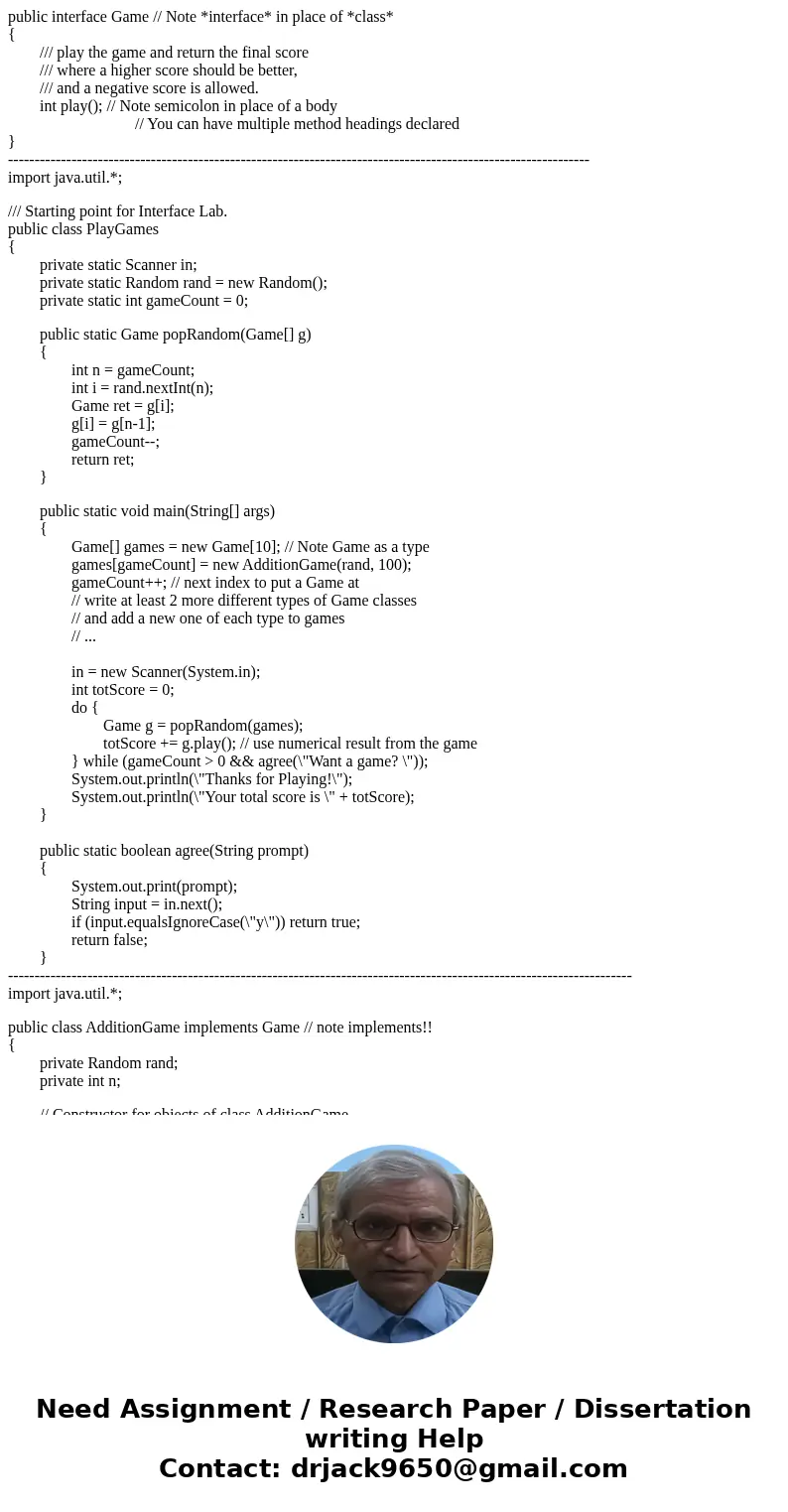
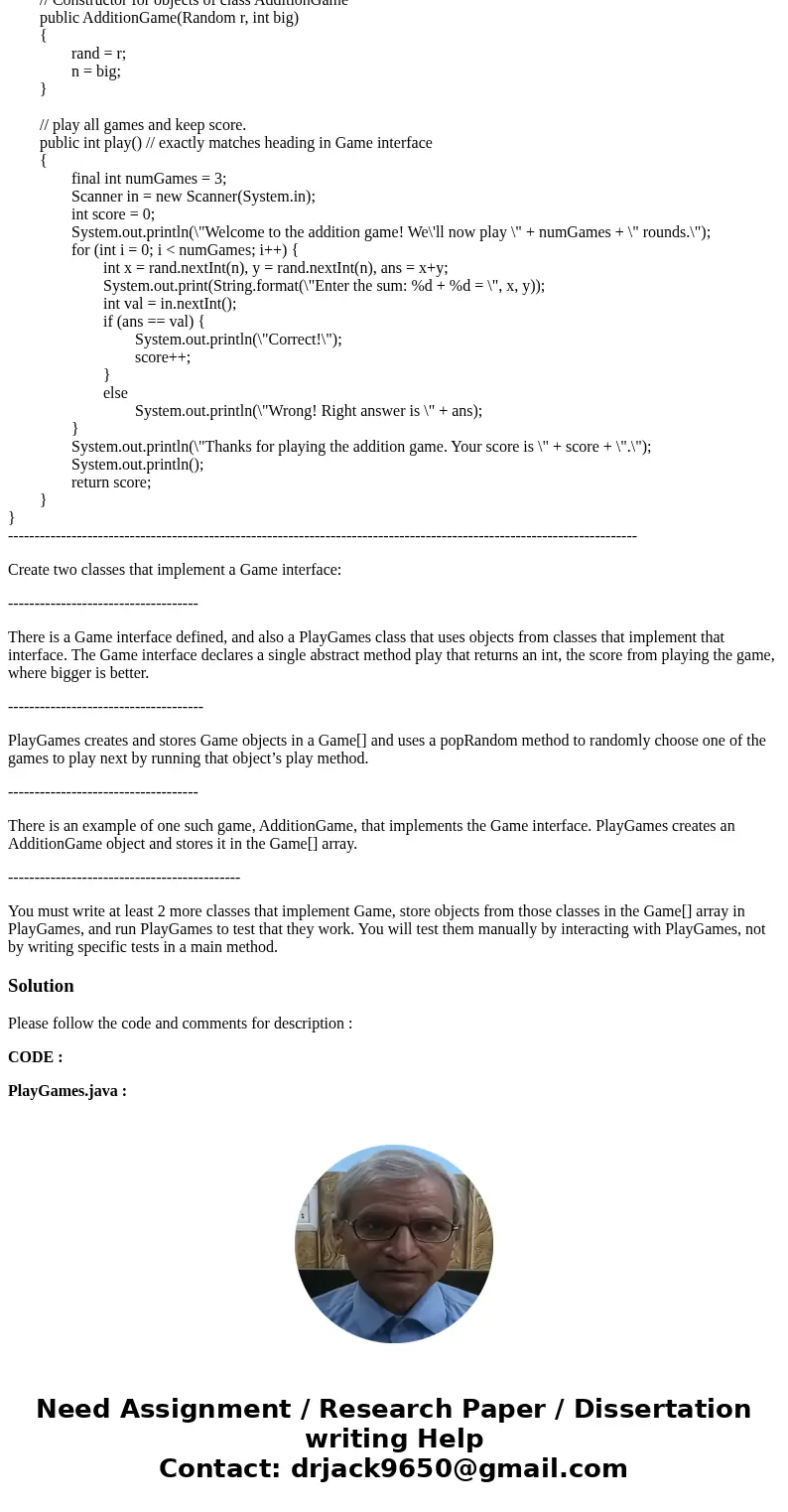
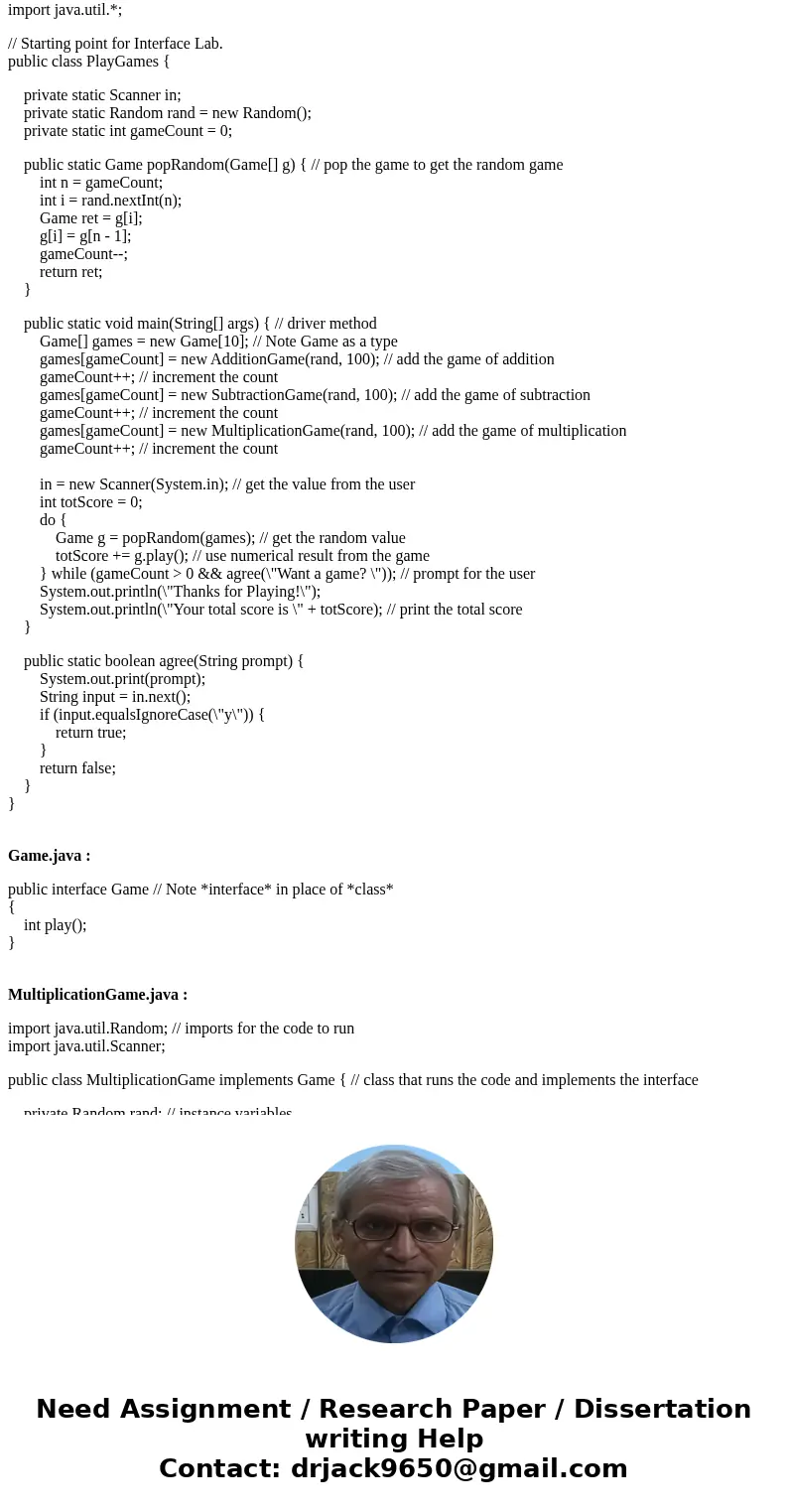
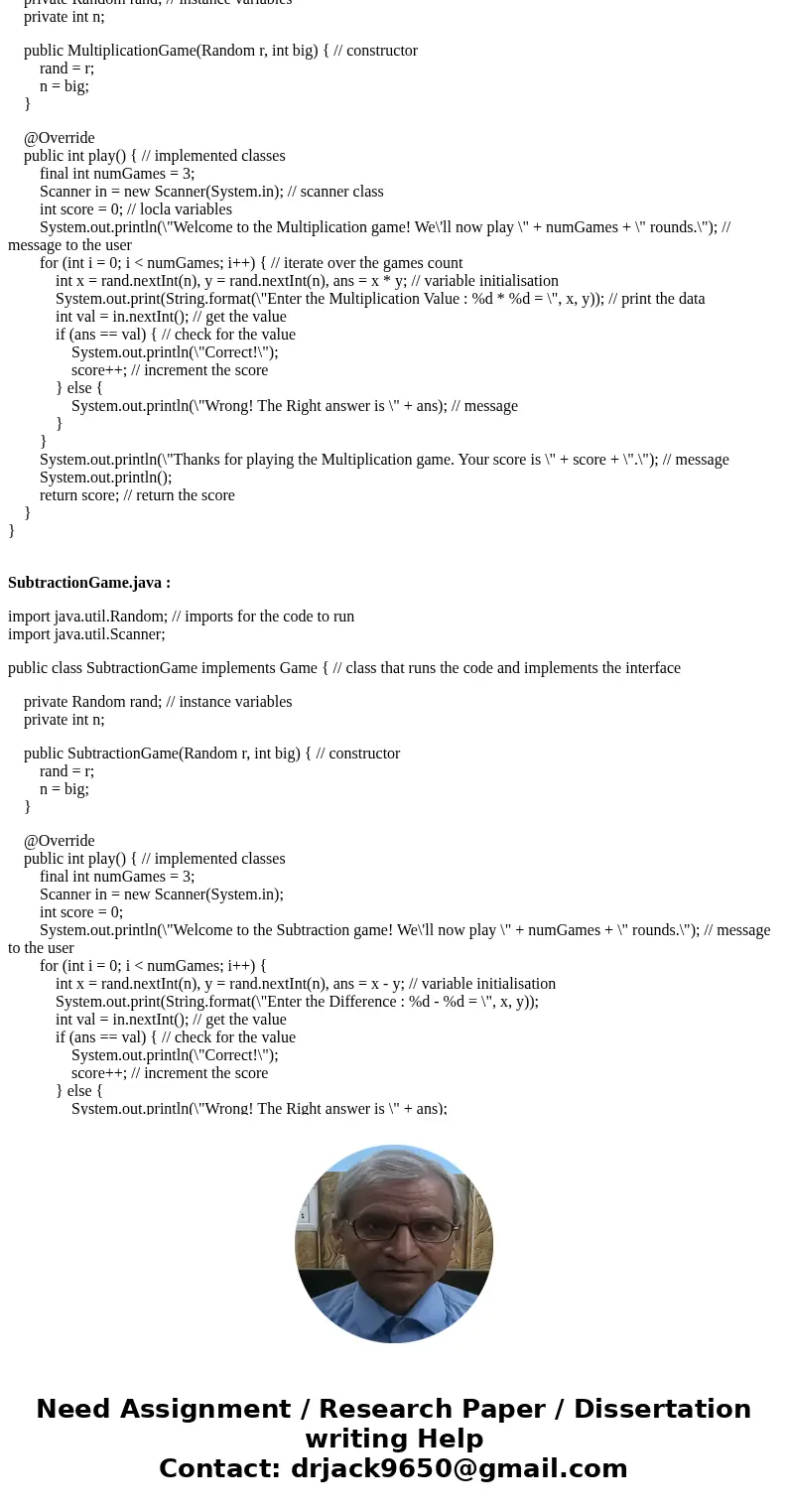
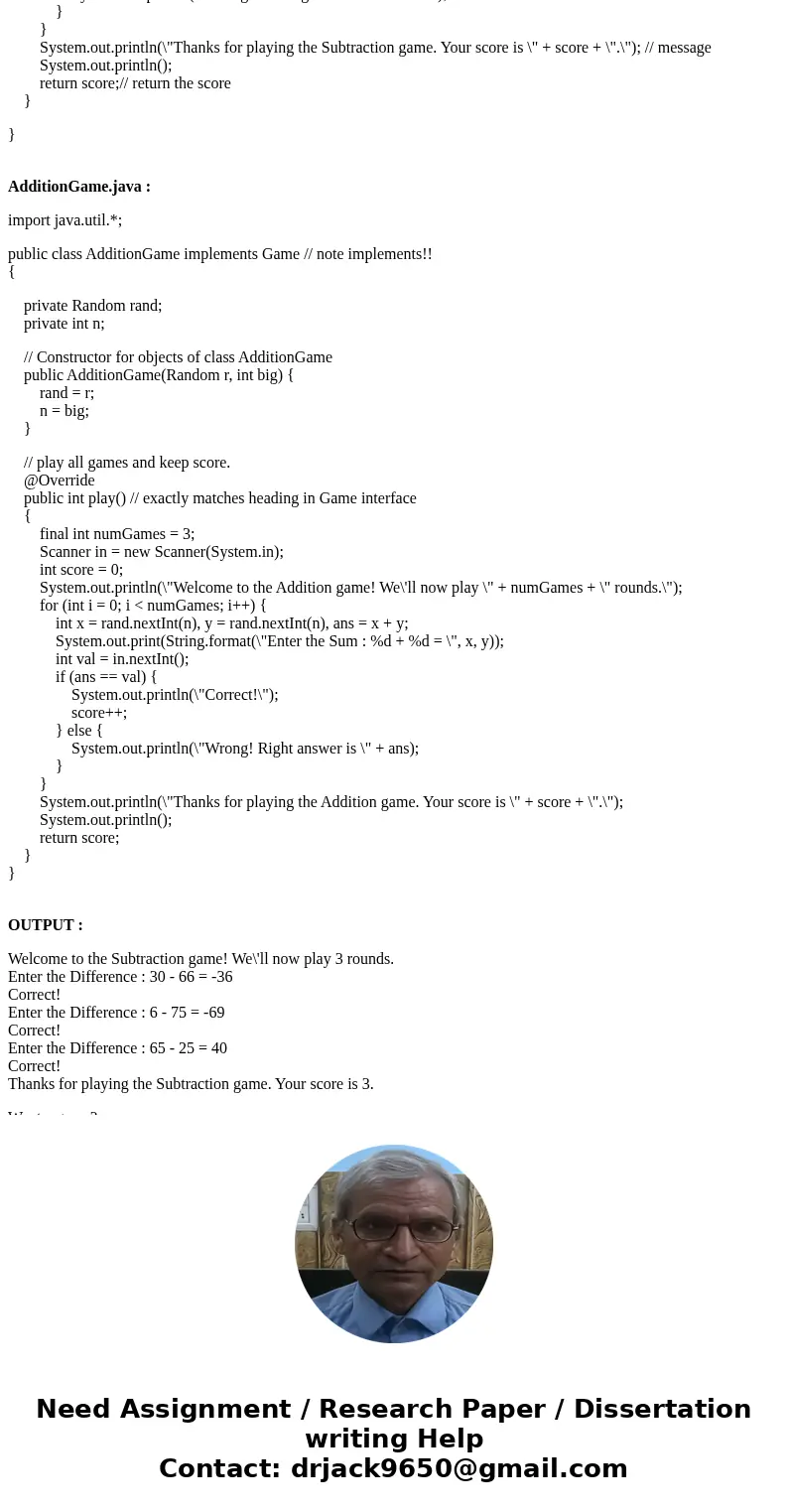
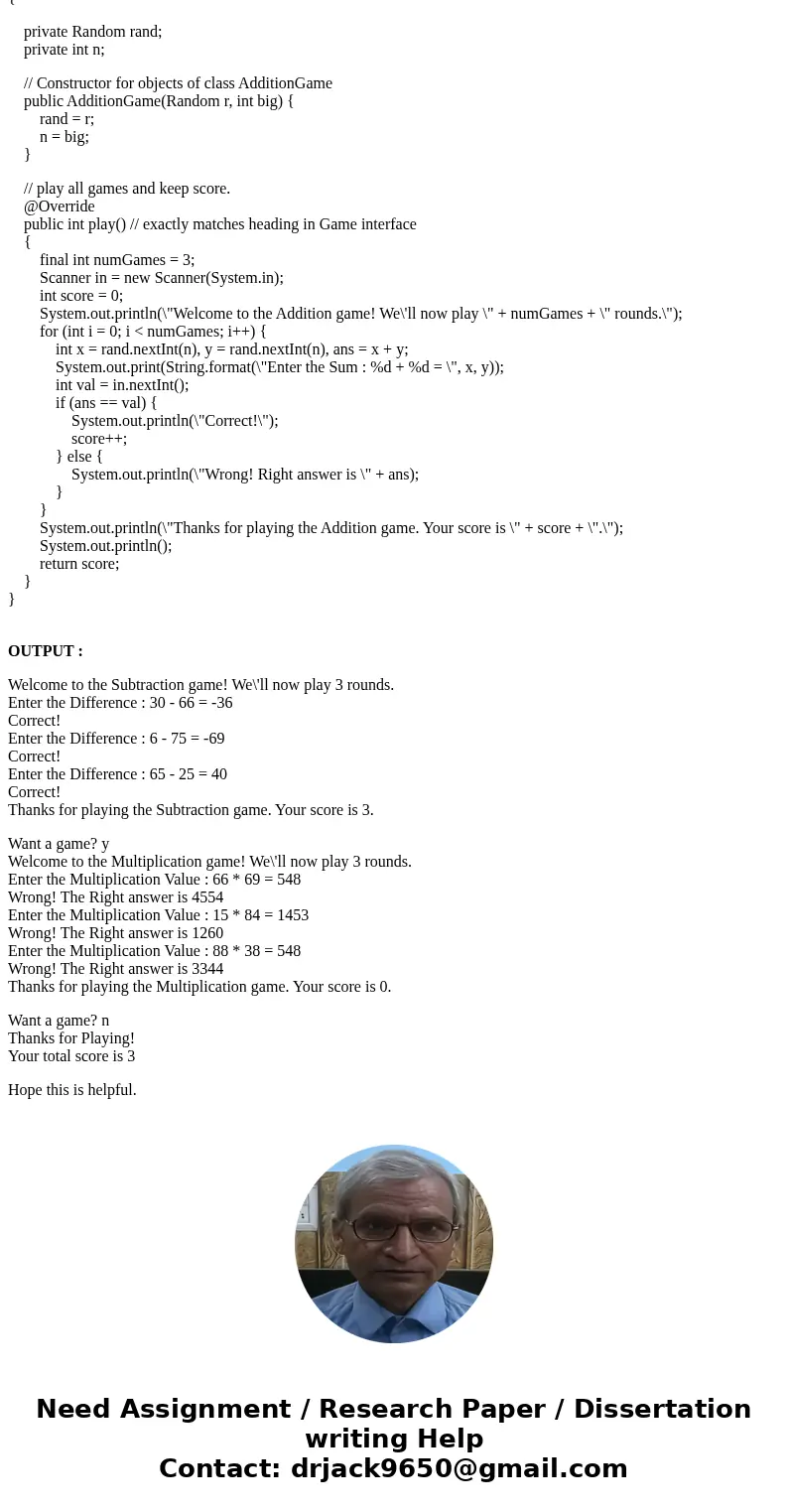
 Homework Sourse
Homework Sourse